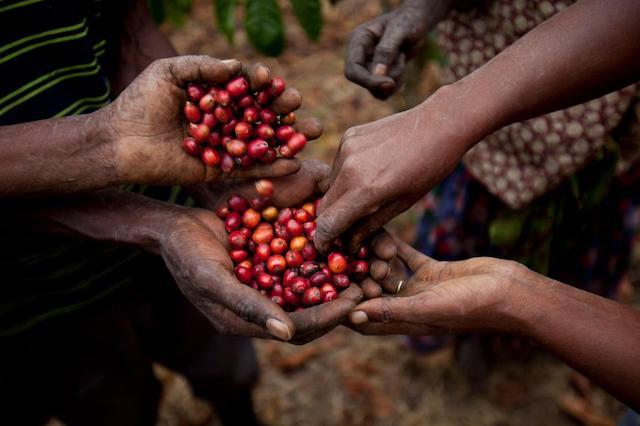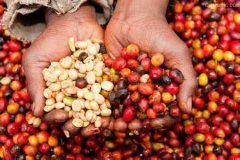The international market for coffee is in the doldrums, coffee farmers in Brazil and Vietnam are unable to sell it, and Arabica has also dropped its price this year.
Professional coffee knowledge exchange more coffee bean information please follow the coffee workshop (Wechat official account cafe_style)
Due to the downturn in the international market for coffee, coffee farmers in Vietnam and Brazil are generally unable to sell coffee despite bumper harvests, in order to resist the downward pressure of prices, and the dream of bears may be dashed.

The international market for Robusta coffee has fallen 17% this year, and coffee farmers in Vietnam's main growing region, Dole province, are generally reluctant to sell until after the Lunar New year.
The price of Arabica coffee has also fallen by 8% this year, so Brazilian coffee farmers keep half of this year's harvest, compared with only 30% in previous years.
The market had expected a bumper coffee harvest in Vietnam this year and looked forward to a bumper coffee harvest in Brazil in 2018, thus depressing the market. But now both countries may hesitate to sell because of low prices.
Ruhr, a coffee expert at ETG in Switzerland, said the export group estimated that there would be a surplus of 5.5 million bags of coffee in the 2018-19 production season.
"Coffee farmers in two countries (Vietnam and Brazil) have become smarter," said Seti, executive director of the International Coffee Organization. The current market is unattractive to farmers, so they are in no hurry to act.
Intimex, Vietnam's largest coffee exporter, forecasts a 5-10% increase in production this year; Brazilian traders are also forecasting an increase in production this quarter, with some even betting that production will hit a record high.
ETG had expected a global shortage of 3.1 million bags of coffee in the 2018 production season, but increased production in Brazil and Vietnam would reverse that forecast. However, due to the reluctance of farmers to sell, some of the excess inventory may be temporarily digested, and the other part may be used to make up for the previously reduced inventories of the two countries.
Brazilian exporter Comexim pointed out that by June 2018, Brazilian coffee stocks will be 61% lower than the previous year, to 1.04 million bags; the U.S. Department of Agriculture estimates that Vietnam's inventory fell 69% last quarter from the previous quarter to 1.18 million bags, the lowest level in six years.
Businessmen point out that although the market is highly dependent on Brazil to increase production, it is still a long time away from the harvest. Moreover, although the weather is fine this year, there are diseases and insect pests, so there may not be a "bumper harvest."
Experts from Chinese food companies point out that 66% of the world's coffee comes from countries such as Brazil, Vietnam, Colombia and Indonesia, so as long as the weather turns bad, it will pose a threat to supply.
The chairman of Intimex said that if the price of Robusta coffee is less than $1.54 a kilogram, farmers will continue to hold back. Vietnamese speculators have the ability to hold large stocks and wait for prices to pick up.
Many farmers in Brazil are organized into large cooperatives and own large cultivation farms, so they can afford not to sell at low prices, while the devaluation of the Brazilian real also gives farmers more money.
Source: economic Daily
Author: Ren Zhongyuan
Important Notice :
前街咖啡 FrontStreet Coffee has moved to new addredd:
FrontStreet Coffee Address: 315,Donghua East Road,GuangZhou
Tel:020 38364473
- Prev

The price of cheap bean variety Robusta coffee has fallen 18% this year, and farmers are reluctant to sell and hoard their goods.
Expectations among investors in the futures market that the abundance of coffee beans will lead to a further fall in prices are likely to be disrupted by sales by farmers in coffee producing areas, Bloomberg reported. The price of Robusta, a cheap bean seed used to make instant and canned coffee, has fallen 18 per cent this year. As a result, Hoang Thi Thom, who grows Robusta coffee beans in Vietnam's Dak Lak province, is only willing to
- Next

Indonesia's coffee production fell 30% this year, coffee demand increased by 10% annually
Professional coffee knowledge exchange More coffee bean information Please pay attention to coffee workshop (Weixin Official Accounts cafe_style) By the third quarter of this year, Indonesia's national coffee production has decreased by an average of 25% to 30%. The sharp drop in coffee production was due to unstable weather and infestation of coffee production centres, with coffee plantations in the eastern part of the country being the most affected. Indonesian coffee exports
Related
- Workers collapse! Lucky suspects that it will introduce freshly cut fruits?!
- 1-point subsidy recipients wear thousand-yuan watches?! Local response: For low-income households
- Can lightly roasted coffee beans be used to extract espresso? How finely should you grind high-quality coffee beans to make Italian latte?
- What is the difference between the world's top rose summer coffee and Yejia Shefi? What are the flavor characteristics of Yega Shefi coffee and Panama rose summer?
- The ceremony is full! Starbucks starts to cut the ribbon at a complimentary coffee station?!
- A whole Michelin meal?! Lucky launches the new "Small Butter Apple Crispy Latte"
- Three tips for adjusting espresso on rainy days! Quickly find the right water temperature, powder, and grinding ratio for espresso!
- How much hot water does it take to brew hanging ear coffee? How does it taste best? Can hot water from the water dispenser be used to make ear drip coffee?
- What grade does Jamaica Blue Mountain No. 1 coffee belong to and how to drink it better? What is the highest grade of Blue Mountain coffee for coffee aristocrats?
- What are the flavor characteristics of the world-famous coffee Blue Mountain No. 1 Golden Mantelin? What are the characteristics of deep-roasted bitter coffee?

